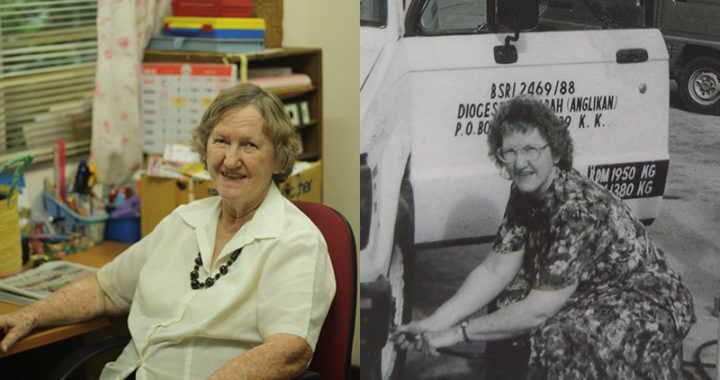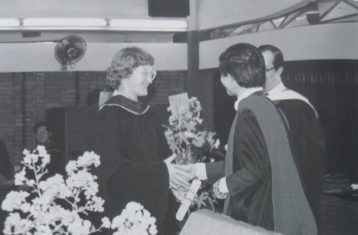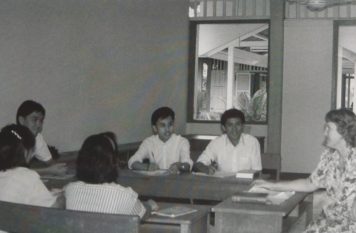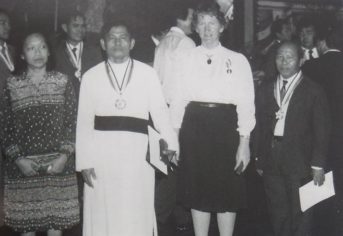Pastor Sylvia Jeanes (also known as “Ibu Suria”) has faithfully served the Anglican Church and the people of Sabah in many different roles since being sent by the Church Missionary Society Australia as a missionary teacher in 1967. In this third and final part of an interview at Rainbow of Hope, her school in Kota Kinabalu, she talks about her years in Kota Kinabalu, where God called her into unexpected ministries, including as a lecturer at the Sabah Theological Seminary and later as the co-founder of a school for migrant children with no access to public education. She also shares her advice for those seeking God’s will for their life, and those facing difficult times. [Part 1 of Interview | Part 2 of Interview ]
Q: How did you go from being principal of the Epiphany Mission schools in Tongud to serving in KK?
I was the only missionary left in Tongud as all the others had gone home. I loved being there. Whenever I drove back from Sandakan and got to the hills just outside Tongud, I would look across at the farms and knew that was home for me. I didn’t want to leave, but Bishop Chhoa wisely decided I should move on.
The way opened for me to do a Master of Ministry at Trinity Theological College in Singapore. For my thesis, Bishop Chhoa asked me if I would write the story of the Interior Mission. I had never written a thesis in my entire life. I’d been to university, but not to the stage where I had to write papers. I didn’t know what to do, so I started writing a story, which was what Bishop Chhoa wanted me to write. But I had a lecturer who said, “You’re not writing a sermon. You’re writing an academic paper.” I got so discouraged. I threw all the stuff into a box, shoved it under the bed and said, “That’s the end of that.” Well, good ol’ [Pastor] Lily Chong was a student there at the same time. She came in, got me off my backside, and I got started on it again. In the end [Canon] Frank Lomax was on the examining committee, who were really pleased with what I produced.
When I came back from Singapore, Bishop Chhoa said, “I want to move you to KK.” Well, I was so happy about that because I loved KK. I moved here in 1987.
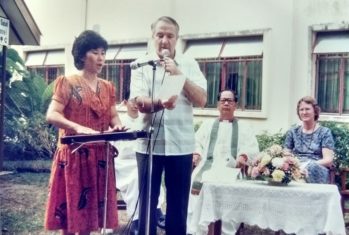
Q: What were you asked to do in KK?
At first, Bishop Chhoa set me up at Likas. I had gone all over the Diocese’s BM-speaking churches from 1982-1986, doing lay training of all sorts—Sunday School, primarily, but also training youth leaders and youth evangelists. Bishop wanted me to bring this work to KK and touch the town churches too. So I went all over for four years in a Land Cruiser: Labuan, Kudat, Tawau, Lahad Datu, everywhere in the interior.
But then the Sabah Theological Seminary (STS) was going to be founded. Bishop Chhoa and [Basel Church] Bishop Thu En Yu were very good mates. They wanted one Anglican lecturer, so Bishop Chhoa said to me, “I want you to go and teach in STS.” I got the shock of my life. “No, I can’t do that,” I said. “I’m not very academic.” “That’s why they want you,” he replied. “Because you understand the culture and you can teach in Malay. They need you there.” So I said, “Alright,” and off I went to STS. But I was like a kid from the country. Even had the dog following me to work every day, like I had done in the countryside, y’know.
Q: How did you get on at STS?
I settled down eventually, though I never really felt fully confident because I was surrounded by people with PhDs. No matter how much they told me, “Oh, but you really can teach. People like to learn from your experience,” I always felt insecure.
Q: Was there anything you did research on during your time at STS which you found particularly noteworthy?
While I was in Tongud, I found out that “thank you” wasn’t a word in their language, because of the structure of their society. If did something for you, there was no need for you to say, “thank you,” because that blessing will come back to me. So if I give you a dog, for example, to help you do your hunting, you might give me three sheets of zinc back or help mend my boat. Reciprocity is the fabric of their society.
Now I didn’t understand any of that at all until I went to do my Master of Arts in Theology at Moore College in Sydney. For my major paper, I wanted to do research on shame, because I knew I did not understand the shame complex in Asia. Westerners don’t come from that background, as you know, and so I had made mistake after mistake. In the end, I wrote my paper on how the shame element is a pivotal value shown in the Pauline letters to the Corinthians. After I studied, I understood. Not perfectly, but a lot more. It helped me a lot, but I’m still learning, like a child in kindergarten.
Q: So you taught at STS for about 18 years, and then you retired?
Yeah. CMS and the Diocese both required me to retire at 65. So I retired from the Diocese in 2006. I told STS I’d retire as well, but they wanted me to come back part-time.
Q: So that was when your church-related work became less. Could you tell us a bit how your school, Rainbow of Hope, got started?
In December 2002, I went back to Australia for a six-month visit after Bishop Yong Ping Chung dedicated this house in Taman Fantasi to the Lord. While I was away, there were changes in the immigration rules for stateless children, which meant they couldn’t go to school. I had an Indonesian lady helper at the time. One day in 2003, she told me that someone wanted me to teach English to some Filipino girls. I imagined they were Filipino maids wanting to upgrade themselves. I said, “I’m not teaching English to any Filipinos!” I was very adamant.
In fact, a little Filipino girl had seen me in the area and told her mother, “That’s the lady who can ‘do school’ for us.” Actually, I used to talk to her mum on the street. One day she came to the house and in the course of the conversation it became clear that she wanted me to do something with her children. Then the penny dropped. “Oh! So you’re the one who wants me to teach these Filipino girls English!” But that wasn’t quite accurate, you see. What she wanted me to do was to save her kids from total illiteracy. But I said, “No, I can’t do that. I’m very, very busy up there [at STS].”
But I looked at her face as she became very crestfallen. And a voice spoke to me and said, “Didn’t my son Jesus die on the cross for them as well as for you?” And I heard, “Does not my Word say ‘love your neighbour as yourself?’ These are virtually your neighbours, living right next door.” So I said, “I can’t promise anything, but I’ll try to help.” The next night they came, eight kids and three mothers. They sat around my dining room table and I tested them. Some of them could read Malay, but they didn’t comprehend very well. The youngest, a 9-year old, didn’t have a clue. He ran from the table over to his mum in tears, as he realised he couldn’t read. Now he’s a young handsome married man with a child.
Q: So that was the beginning of the school.
Yes. It grew so very, very fast. Within 6 months we’d grown to 40 kids. Within another 6 months we’d grown to 70. I kept thinking all along, “We’re going to close this down one day.” We outgrew this room, so we went under the house. We outgrew under the house, so we put tents in the garden. We outgrew the tents in the garden, so we rented No. 3 down the road. We outgrew that, and so we rented the house next door. And now we’re filled to the seams here with 160 kids. There came a time when I thought, “This is not going to close down. You better grit your teeth and carry on.” And so I did.
Q: Wow. Do you think the church has a role to play in such work with migrant children?
Oh, definitely. It’s very clear in the Scriptures whom God loves. He loves the needy, He loves the foreigners, He loves the oppressed. Right back in Genesis, it’s very clear that God’s mercy is not just for Israel but for the whole of humanity. Also, we have to remember that Jesus had no home to call his own. If you’re a Christian, it means you’re a follower of Jesus, which means your model is Jesus himself. How did Jesus live? Can I live like that? Mind you before this I had a “club mentality.”
Q: Most of us do. We think, “These are my people, those over there are not part of us.”
Yes, it’s a miracle we change from that and start to live like Jesus. We can never live exactly like Jesus, of course, because he was extraordinary in every way. But the love for humanity at large is something we can learn from Jesus.
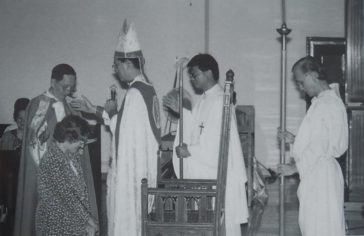
Q: Have you any advice for young people and older people who are considering serving God in a more dedicated way?
Press on with courage. Unfortunately young people here often have to do what their parents tell them to do. But if you feel drawn to full-time ministry—either in local ministry or the mission field—have courage to go forward and do it. My parents never agreed with me doing what I did. They thought I was stupid and that I was giving my life away, but I actually found my life. I have been the benefactor of what I’ve decided to do in my life 60 years ago. I have been enriched in every way. I never regret doing what I did.
Every person should dedicate their life to the Lord. Every person should not be praying, “Please bless my efforts to do this,” but rather, “God, what do you want me to do?” He doesn’t want everybody to be a minister. But He wants everyone to be willing to do whatever He has chosen them to do. Sometimes He’ll say, “I want you to be a lawyer, to stick up for justice.” Or a teacher, or a doctor. Do it, bravely. A doctor might be considering, “How do I serve the underprivileged people of the world? Have I to go to somewhere like Nepal?” God will show you. He is the God who speaks.
Q: Amen. In closing, given your long experience in the ups and downs of life and ministry, have you any words for those who are going through tough times?
In my times of trouble, I have to do things hand-in-hand with the Lord, not thinking it all by myself. I do what I need to do under his guidance, but the end-result is in His hands. I always remember Dr Alan Cole saying to me many years ago, “Sylvie, Sylvie, God has built the rest of your life based on your mistakes.” I’ve made many mistakes. But still God has not left me. God has used my mistakes also to help other people. I was counselling a woman not so long ago and she told me a story. I said, “You know what, exactly the same thing happened in my life.” She was amazed. But I had a better understanding of what she was going through very simply because I had been through the same thing myself.
Sometimes God allows us to make mistakes because we learn from them. We’re not robots but human beings. Tears come to my eyes every time I think about wasted years, but at the end of the day our loving God says, “I know.” For many people God has a cane in his hand, because in our society performance is so paramount. “If you don’t perform, I’ll give you a beating.” Unfortunately people transfer it over to God. He’s not like that! He’s a far more loving, caring, sympathetic, empathetic God. We’re very enslaved by our culture and our worldview. God can set us free even from our own worldview.
Q: Sylvia, thank you so much for giving us your time to be interviewed.
Thank you very much.

